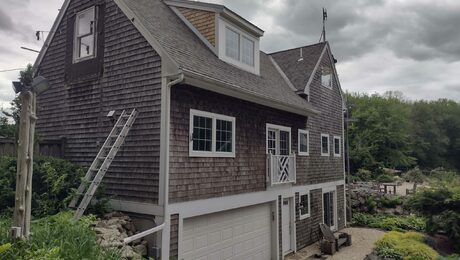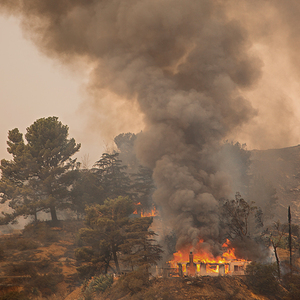We’ve all been in the zone at times were all our cuts are right on, production is way up and overall quality is top notch. What do you guys do to increase this time and minimize the frustrating times where you leave out one important measurement, read the level quarter bubble off, etc.?



















Replies
To be quite honest, given the opportunity, I work solo, I "forget" the phone in the truck for a few hours, grab a soda, and turn on classical music.
Some of my best work is on Fall Saturdays when i get Live From the Met. Opera makes for good trim
Best day ever was an acerage house. Should say 2 days. We got hit with a whammie of a storm, snow, wind, drifts, cold, miserable weather. I was the only guy who could get a truck up to the place, and it was an ironclad guarantee that I'd be alone all day long. I got a lot done.
"If you pick up a starving dog and make him prosperous, he will not bite you. This is the principal difference between a dog and a man." - Mark Twain
I'm also a fan of alone time and have been the most productive working solo. One jobsite was out in the sticks and we were able to live during the week in the ranch hands bunkhouse and travel home for the weekend. Given a chance it was great to spend the weekend alone up on the mountain. One of the best times of my working career was spent on one of those weekends. The bunkhouse had no running water or electricity and was out of cell range so everything was quiet. The log house had a monster of a window package and created fantastic views from throughout the house.
Don
Ditto for the 'alone time' that RW mentioned. I need to be relaxed and yet focused. Then the details start to spread out in front of me, I can picture it all way in advance. I've been known to come in on a Sunday to do important layout so there would be no apprentices to supervise, no questions to answer.
As to increasing the time in the zone, I think good preparation and sequential tasking make a big difference. If I arrive with a plan and I know I've got all the tools and materials I need before I get out of the truck, I tend to get in the groove almost right away. And I often consciously decline or defer tasks that will be a distraction to the one at hand. Had to tell the boss that a few times:"sorry, I'm not in a position to look at that right now, because _________________ ..." Might get them PO'd but then again same result if the current task takes too long because of distractions.
And I often consciously decline or defer tasks that will be a distraction to the one at hand. Had to tell the boss that a few times:"sorry, I'm not in a position to look at that right now, because _________________ ..." Might get them PO'd but then again same result if the current task takes too long because of distractions.
A step further, turning down help of the slower members of the crew is sometimes hard to do and not hurt anyones' feelings, but essential at times to avoid the distractions these guys cause. I've had to work hard to find ways of doing this without being seen as the rest of the crew as someone who is difficult to work with.
Like you sequential tasking is what puts many projects on autopilot and some coworkers simply don't seem to think that way and pause to contemplate the process at each step. With many carps that have worked smaller jobs and never developed processes that work well for repetitive work, it's been hard, but rewarding to show them the advantages of doing some things fast to allow more time for the more detailed or important tasks.
Cheers,
Don
I've found I'm most productive from 7am-11:30am. If I get to the site about 6:30, get set up, and start going. As long as the phone isn't ringing off the hook, I rarely notice what time it is until I start to get hungry.
---------------------
Swimming through the ashes of another life, no real reason to accept the way things have changed. Wrapped in guilt, sealed up tight.
ditto on the working alone---and early.
also----- i like to quit early and go home early---often by 1:00 or 2:00
I take a shower and then lay on the couch for 15 minutes---- my wife thinks I am napping---because my eyes are closed----------------------
but really---I am visualizing EXACTLY what I am gonna do the next day----down to the smallest detail " I am gonna park the truck HERE, the ladders are gonna set up THERE, tarp is spread here and here, plywood chute over there and there, ladder jacks and pick NOW, have helper pre-stack materials right here, run feeder air hose up this way-------"
you get the idea---basically i rehearse the next day mentally----virtually every decision of importance is made before I arrive to the job----all the variables already sorted through-------and those decisions are made under the most favorable circumstances----at home clean,cool,dry, and laying on my own couch.
Stephen
but really---I am visualizing EXACTLY what I am gonna do the next day----down to the smallest detail " I am gonna park the truck HERE, the ladders are gonna set up THERE, tarp is spread here and here, plywood chute over there and there, ladder jacks and pick NOW, have helper pre-stack materials right here, run feeder air hose up this way-------"
I do the same thing. I usually do it right before falling a sleep, or when I first wake up. For whatever reason I can really focus my thoughts when falling a sleep. If I have a particular "problem" with how to do something, I'll fall a sleep thinking about it, and wake up with the solution. Sounds weird, but it happens all the time.
I like to quit around 2:00pm also. Once I get the idea in my head about cleaning up, my productivity goes out the window. I've learned once I "quit" mentally I might as well clean up, and go home. It is useful for getting material. I'll stop at the yard on the way home, and have what I need for first thing in the morning.---------------------
Swimming through the ashes of another life, no real reason to accept the way things have changed. Wrapped in guilt, sealed up tight.
One thing I like to do at the end of the day - after job site is picked up and truck/trailer loaded and help has left - is take another five minutes.
Metaphorically, I like to see the "forest" at the end of the day instead of the all the "trees" I looked at that day. I walk down the street or stand in the entry door or climb on the wood pile...anywhere to get a birds-eye-view. I stop, turn around, stare and ask myself questions..."In general, how does it look? What's the first thing that hits me? How do I set up for tomorrow? Where do I need to be in three days or by Friday? Am I missing anything? Materials?
It helps me to take five minutes, with no one around, and look at the job before I get in my truck and think about it on the way home. This has helped me numerous times with the homeowner. We all know they drive up the road and start looking at the "forest" first and then get closer to the "trees".
Preperation.
As someone already mentioned, knowing you`ve got all the tools and materials at hand keeps the mind free to focus on what needs doin`. Whether conciously or not, knowing I can take a project only so far before I have to stop to pick up this or that tends to slow everything down.
Did a small framing project a few weeks back. A couple partition walls.....frame and rock. Come back after taping and priming was finished to install doors and trim. I had allowed three days for the frame and rock portion as I was going to be working solo. Got it done in a day. Homeowner was thrilled.
If every job went that smoothly I`d be retiring 2/3 sooner than I plan to. (I might actually be retired by now)
J. D. Reynolds
Home Improvements
think ahead.
plan it all out before hand ... be prepared ...
then just work.
slow and steady wins the race.
that ... and experience plays a big part. Not being nervous about drilling holes into a $3,500 vanity because you've done it before helps ... and experience also helps you know when measuring and cutting to the closest 64th isn't needed.
for myself ... I started as a kid doing rental remodels. Learned the craft well. Then moved to way-high end stuff ... learned how to work with big money materials ... then ... started subbing for different companies ... and ended up having to increase my cabinet install speed to make money and hit the deadlines. Had to learn where to cut back on the "craftsmanship" ... so to speak. Since that went against my nature ... taught myself how to get "close to perfect" results with decent speed.
Now I have two speeds ... "kinda perfect" ... for the basic sub jobs where anyone else would just slam them in ... and "near perfect" ... for the times when I'm being paid enough to make things look as good as humanly possible.
Both ... are way better then "good enough"!
so I say learn to do "near perfect" first ... then work on speed. Like an old boss told me ... we'll work on "good" first ... then "fast" ...
Jeff
Buck Construction
Artistry In Carpentry
Pittsburgh Pa
Entire post very well said. Puts a good spin on "speed vs. quality" arguments. Thanks. Well said.I get paid to do carpentry. That makes me a professional.
If I work on my own house does that make me a DIY?